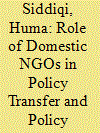| Srl | Item |
| 1 |
ID:
180251


|
|
|
|
|
| Summary/Abstract |
Pakistan is a fragile democracy repeatedly facing problems in the design and implementation of police reforms. The scholarship on public policy highlights the role of non-state actors like NGOs in improving policies, especially through policy transfer and diffusion. In 2002, Pakistan designed a police reform, PO 2002, through collaborative methods, and implemented it nationwide for a short time. Using process tracing within case study and interviews with key informants, this article evaluates the role of domestic NGOs in the design, implementation and change of PO 2002, with special focus on policy transfer and policy diffusion. The evidence collected showed that in 2000, the nascent NGOs lacked expert knowledge to make any contribution to policy transfer. Later, their absence from the implementation phase and faulty methods blinded them from unveiling the critical policy lessons and impeded their ability to play any credible role in future policy diffusion.
|
|
|
|
|
|
|
|
|
|
|
|
|
|
|
|
| 2 |
ID:
177778


|
|
|
|
|
| Summary/Abstract |
This comparative research looked at the causes of the variance in provincial response to COVID-19 in Pakistan using the policy capacity framework. Pakistan decentralised its policymaking in 2010 and granted autonomy to its provinces to mitigate the crisis, control law and order, generate resources and reform their institutions. There were serious concerns that the small provinces lacking the required policy competencies will not be able to deal with a crisis such as COVID-19. Using process tracing and inductive mixed methods, this research finds that the relationship with the centre, effective networking with international agencies, non-state actors and China-Pakistan Economic Corridor (CPEC) are the key factors that improved the policy competency of the small provinces, whereas the weak steering ability of the state machinery, complacent and negligent behaviour of the political and administrative institutions and tension with the centre adversely impacted the analytical, operational and political competencies of the two large provinces of Punjab and Sindh, resulting in the spread of COVID-19 cases in these provinces.
|
|
|
|
|
|
|
|
|
|
|
|
|
|
|
|